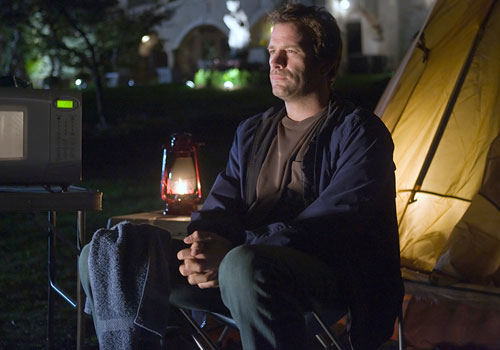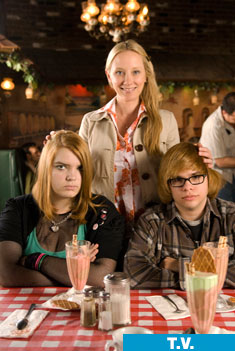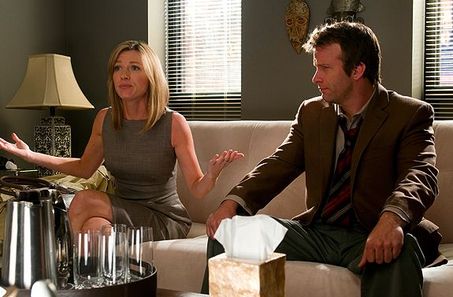
Big Dick Doesn't Go As Far As It Used To
by ALEX CARNEVALE
Ray Drecker's wife divorced him because he was only pulling in a gym teacher's salary. On last week's episode of the HBO series Hung, Drecker eats dinner at the home of her dermatologist Jew of a second husband. After coffee, he asks the good doctor, "How did a guy like you get the girl from a guy like me?" It's not lakeside property, because Drecker (Thomas Jane) has that in spades. He doesn't have to go on living in a tent while he repairs his dreadful cabin of a house. He just has to sell out to his neighbor, reap a tidy profit, and relocate.

But he doesn't. He won't. He's used to being there. It's his parents' house, after all. He's been living on the lake since he was a little boy. Most things in life get stale — children, marriage, work, friendships — but humans never tire of sticking their toes in the water, and sometimes swimming in it.
American men and women of a certain age are used to a particular idea of their country. As it must, it bears no resemblance, none at all, to the country their children grow up in. There is no way to stop the advancement of technology, and even if there were, do you think people were happier before Prodigy and AOL? It seems like they weren't, in all the ways that count.

Ray's nostalgia for the past is immature; as Tony Soprano once put it, "Remember when is the lowest form of conversation." Like Ray Drecker, he's no smarter than he looks. Nobody feels sorry for a guy with a monster dick who owns lakefront property. They hate that guy. Sometimes the person you're making the show about turns out to be the least interesting person in it. This is certainly true of Hung, where two women outshine every single appearance of Thomas Jane's baby's arm holding an apple.
Uma Thurman once asked John Travolta, Betty or Veronica? The hypothetical positions two creatures who could not be more different; the poor, effacing blonde whose industriousness is the key to her reward, and the spoiled, impotent daddy's girl whose rogueish father follows her around. Hung cleverly swaps the hair color of the two, and twists once more for good measure.

The two major women in Drecker's life are his ex-wife Jessica and his business partner Tanya Skagle.
The first is portrayed by Anne Heche in a masterful performance that Elizabeth Perkins should take notes on. We never see her and Ray as they were as a couple (except once in flashback during the show's hour-long pilot) but it's not hard to imagine her girlish side giving in to Drecker's length and girth. That she rejected that for a l'chaim (Eddie Jemison) with smaller package just shows what a special woman she is.

The second woman in Ray's life is Ray's pimp Tanya (Jane Adams). The scenes belonging to her are among the most disturbing in all of television. She's such a pathetic person that her identity folds in on herself. Despite being startlingly tough to like, Tanya has somehow turned that all the way around and being sympathetic. It's like watching a crowd of people cheering loudly while someone's greatest faults are exposed.
The show had her romancing another Writer (in the Wonder Boys "I am A Writer" sense), who she confesses to, informing him that she's blocked creatively. He turns down sex the next time they see each other, pitching some bullshit excuse, causing her to wonder later, "Why do men only want to fuck me when they're drunk?"

In comparing Tanya to her male business partner, we can marvel at their mutual lack of taste. Both accost a client at her workplace; a client who pays well and on time and demands nothing more than her fantasy fulfilled.
Although we feel bad for what they require from their johns, it's like Hung is bringing the literary concept of the unreliable narrator to the screen. Both Tanya and Ray drink too much, both require too much from other people, so much so that it's difficult to watch. A woman who has reached the depth of her self-loathing and turned back is like a man with a big penis, is the only probable conclusion that can be reached from their union.

The problems that Ray Drecker has with the women in his life are relatively simple. Since his female client's dream was to drag him into couples therapy, he should have used the time to ponder his own relationships with the fairer sex. As in Hung co-creaters Dmitry Lipkin and Collette Burson's last series The Riches, there are only two options for how Drecker, or any man, can relate to a woman. He can worship her, or he can step on her. The first is no more fulfilling than the second, and claims as many victims.

A boy in a home in Detroit on the water is taught to love his mother. He would as soon give his property up to the Jew next door as he would piss on his mother's grave. (It's amazing Drucker doesn't channel his rage at the world into his local chapter of the Ku Klux Klan.)

For this reason, Ray is a natural prostitute. He worships a woman for a brief time, maybe an hour for the most vivacious of those seeking happiness consultants. Then he is free to step on her. I point this out because Hung keeps wanting to turn selling your body into something it isn't. Whoring is a business. It doesn't lead to marriage or happiness, it will lead most certainly to money. All whores understand that, the richest ones best of all.

Watching a woman pimp a man and take her cut makes the audience feel a certain way. I suppose uncomfortable, and perhaps fascinated, too. But at its heart we recognize that this kind of work isn't healing. Most kinds of work aren't. One generation had its industriousness to depend on. Ours probably won't, so what will everything hinge on? Some will turn to law, or medicine. I salute their choices, or at least the ones that are freely made. But I won't serve my government, and I won't bill by the hour. What's left of honest work? Not much. Then again, there's nothing wrong with being a whore, except that it isn't good for you.

Natural selection was invented by Darwin to describe how humans improved over time. What traits are being selected fpr now? What skill except dumb luck carries on the maudlin genetic pattern of humanity? The weak live, even thrive. The strong, the hung do as well — despite what Lipkin and Burson want us to believe, it's not an inverse relationship. Even in this darkest of economic climates, every teenager has a cell phone and a credit card.
The gap between us and the world that worships us like Ray Drecker's phallus ever widens, until it will be people of the same age across continents who find themselves as unrecognizable as I do the customs of my grandparents. Either they'll go on worshipping, or they will step on us.
Alex Carnevale is the editor of This Recording. He tumbls here.

"Day to Day" — Amy Millan (mp3)
"Bury This" — Amy Millan (mp3)
"Towers" — Amy Millan (mp3)
